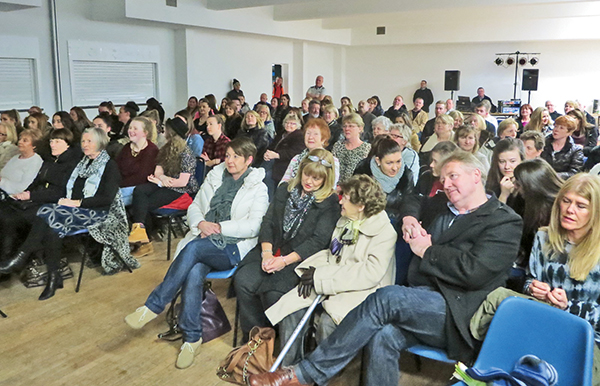
Image supplied by Sueann Moore.
February 6th saw the arrival of a thought-provoking play highlighting the issue of suicide awareness to Clanna Gael. Bring Me Back Alive takes place in a modern Dublin youth centre and focusses on the tell-tale signs of depression and the need for mental health services to deal with this escalating crisis.
It details the devastation that suicide brings upon family and friends but also maintains that there is always hope, and the play takes as light-hearted approach to the issue as possible.
The play is written by Patricia McCann and directed by Geraldine Pender. The performance in Clanna Gael was presented and sponsored by Ringsend and District Response to Drugs in partnership with Ringsend Community Services Forum.
The starting point came when Michelle Stanley of the Spellman Centre made contact about staging the play in Ringsend after having seen it performed on Donore Avenue, where wrist bands were handed out by Console, a 24 hour service that aims to support suicide prevention.
Bring Me Back Alive is split into three sections, with Part One dealing with the central character coming to terms with his feelings of despair, Part Two highlighting the agony of his mother and finally Part Three showing the main protagonist come to terms with the impact his death would have had on his loved ones.
The cast featured Joan Pierce, Jessie Morris-Toolen, Jasmine Brady, Tony Coloe, Jack Gavin, Courtney Black, Klye Bradley-Donaldson, and Aaron Lockhart.
“We went to see it not really knowing what it was all about beforehand,” Michelle Stanley told NewsFour. “I thought it was brilliant. Basically, the message was about talking rather than going through it on your own.”
The play also had a presentation at Warrenmount school on March 4th, and Michelle says that the parish priest of St Catherine’s Church on Meath Street is eager to bring the play there. There are also plans for the play to be staged at Inchicore College in the foreseeable future.
“It would be great if all the schools could see it because there is a lot of it (suicide) going on lately,” Michelle said. “It would be great if they could see it and see the devastation that it causes.”
The night in Clanna Gael turned out to be a great success, with the hall reaching almost full capacity on the night. The cost of entry was a donation of €5, although some free seating was afforded to those in financial hardship.
Free entry was also granted to those who had teenagers or children present. Overall, the night itself cost close to €1,000 with ticket sales used to cover the costs for sound equipment, lighting and other necessities on the night.
By Craig Kinsella

